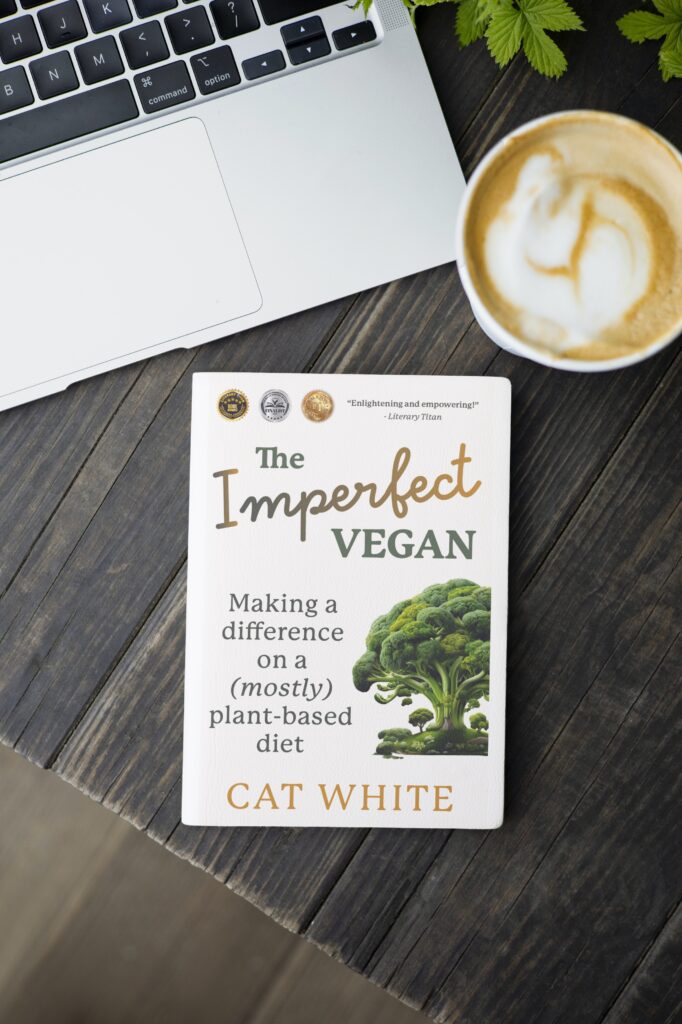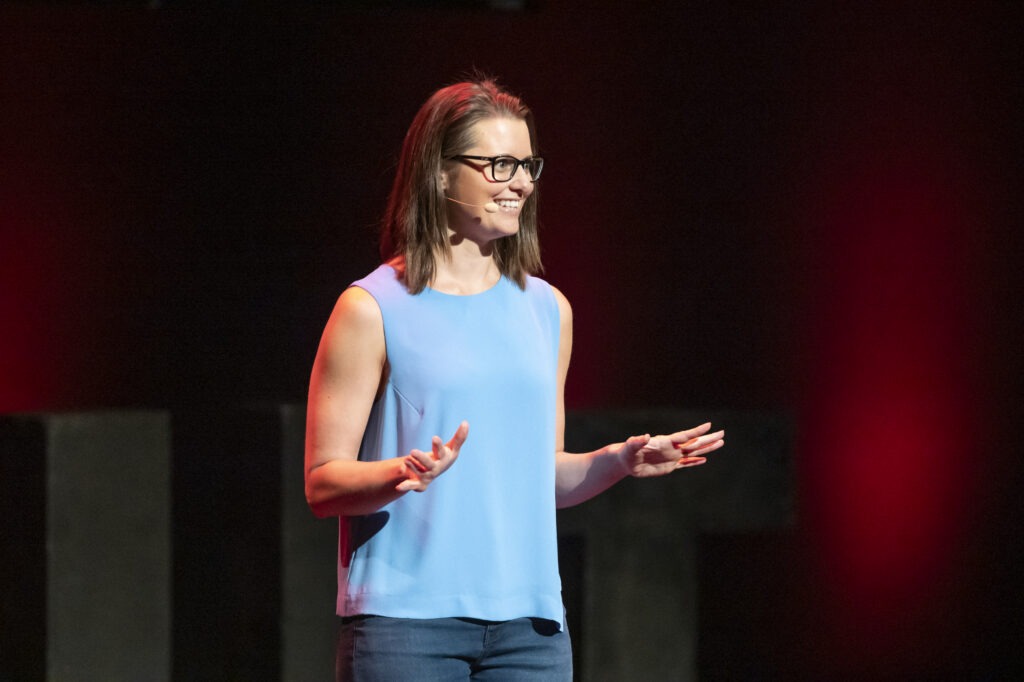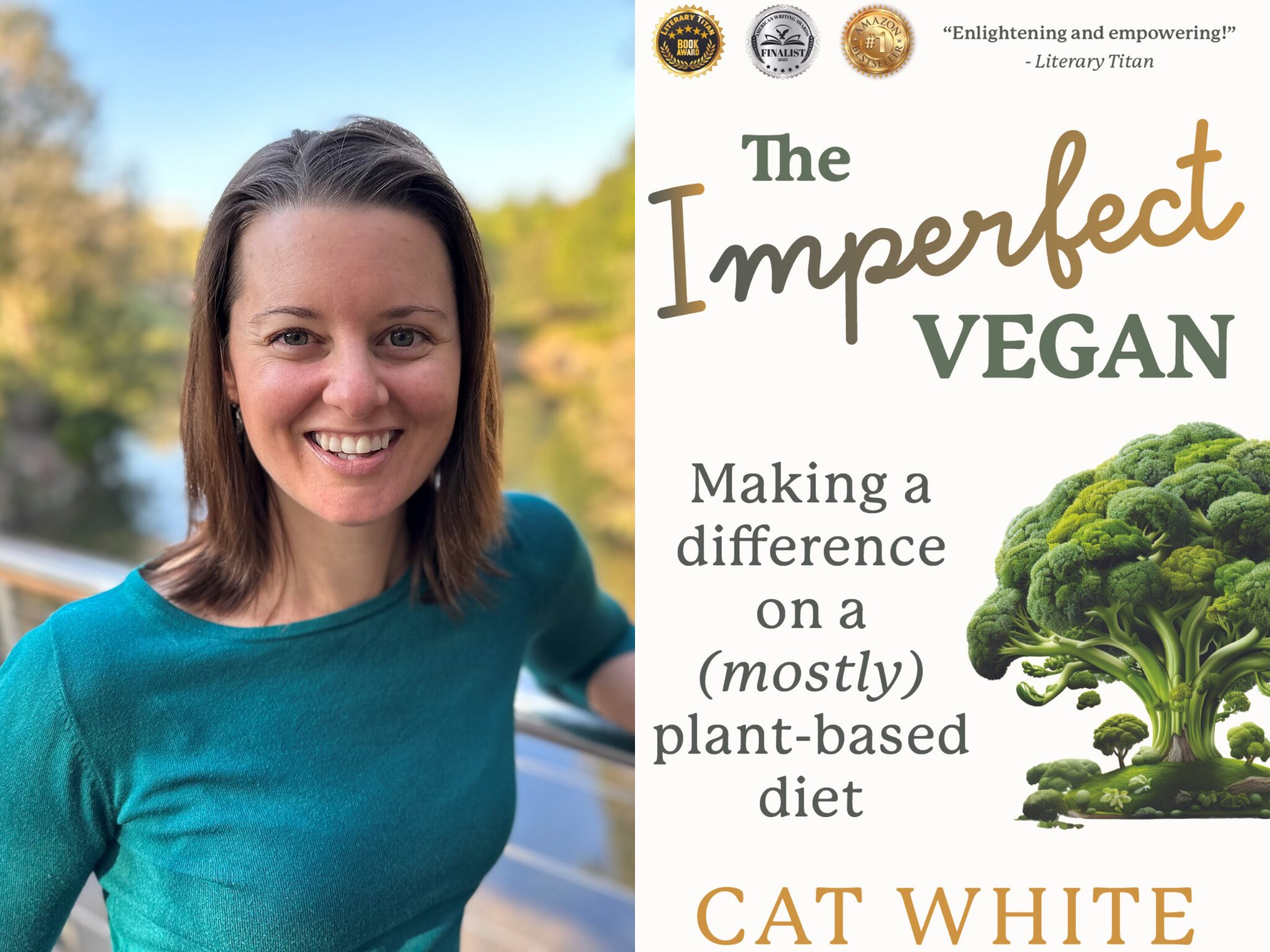‘Farmed Animals Don’t Have Cheat Days’: Q&A with Cat White, Author of The Imperfect Vegan
7 Mins Read
Should veganism be so binary? In her new book, The Imperfect Vegan, author and TedX speaker Cat White argues against that outlook. Speaking to Green Queen, she explains why we tend to associate absolutes with our diets, the need to do something, and revelling in the grey.
“The world doesn’t need 100 perfect vegans; the world needs billions of people doing the best they can.”
This was the line that changed how Cat White saw her diet and lifestyle. The author was complaining to a friend about the presence of animal-sourced foods in everything, and having cravings for the food she used to eat before going vegan.
But her friend’s statement eased the pressure, made her see through and celebrate the grey, and planted the seed that led to her new book, The Imperfect Vegan. Published in October, the title has received critical acclaim, and was a Gold Winner at the Literary Titan Awards and a finalist in three categories at the American Writing Awards 2023 with one reviewer Emma Megan stating: “Everyone—vegan and non-vegan alike—who cares about our fate and the planet should read this book”
As Veganuary – a campaign of absolutes – begins, we spoke to White about her book, the idea of an imperfect vegan, and how you can make a difference on a ‘mostly plant-based diet’.
This interview has been edited for clarity and concision.
Green Queen: How would you describe an imperfect vegan?

Cat White: An imperfect vegan is someone is does their best to choose the vegan option when they can, but they don’t give themselves a hard time if they slip up. An imperfect vegan also understands that we’re humans (not robots) and we’re not perfect in any area of our lives.
I chose to use ‘imperfect vegan’ because ‘vegan’ is the term that is most often used when we’re talking about not eating animals, as opposed to other terms such as ‘climatarian’ or ‘flexitarian’, which would require too much explanation each time someone asks you about your diet. It’s more about the mindset (of allowing imperfection) rather than the rules about what’s allowed or not allowed in the diet/lifestyle.
GQ: Why do you think perfectionism is associated with a vegan diet?
CW: Perfectionism is a common goal to strive for in veganism, and rightly so – it’s a worthy cause and it’s a point of moral consideration. When we’re talking about how we treat another individual, there really is no question that complete elimination of exploitation (or perfection in the vegan way) is the goal. Farmed animals don’t get to have “cheat days”.
In an ideal world, there would be no animal products anywhere and it would be obvious and easy to avoid them, but we don’t live in an ideal world. As much as we would love to be perfect all the time, we have to understand that sustainability is a more realistic goal, and it helps us to maintain the vegan journey for the long run if we don’t beat ourselves up for not being “perfect”.
GQ: Do you believe reduction is a more practical approach than elimination?
Reduction is definitely a more practical approach than elimination, at least on the grand scale. Some individuals might find it easier for themselves to eliminate animal products from their household entirely, but most people struggle to go “cold turkey” (pardon the pun).
As a global society, the more we reduce our demand for animal products, the less there will be, and the easier it will be for everyone to choose the plant-based option. A billion people reducing their consumption of animal products by even a third (one meal a day) is going to do so much more than a handful of vegans who completely eliminate all animal products.
Also, the reduction approach makes it seem less scary for people to “give it a go” – they’re not put off by this unachievable standard of perfection. I believe the reason that many people try vegan but give it up is because they feel they can’t be perfect at it – and when they revert, they go back to their full meat diet. If we allowed people to be ‘mostly’ vegan, they’re more likely to continue doing their best most of the time. We’ll eventually get to the tipping point where this becomes the default.
GQ: How would you respond to people saying you can’t be mostly vegan – that you either are or you aren’t?
People who say you can’t be mostly vegan are saying this from the moral standpoint. And they’re right! You really can’t decide to be against something one day, and then okay with it the next day. They don’t like the idea of using the word ‘vegan’ to promote any reduction/part-time solution, because they say it waters down the original intent of the meaning of the word.
However, even a cursory understanding of language shows that words morph and change over time – I still remember my mum being confused when I would say that something good is ‘wicked’ – and I believe it’s time for the word vegan to become more inclusive. People come into this lifestyle for all different reasons now – animal, the environment, health, etc. – and if we want to achieve the ultimate goal of eliminating animal exploitation, we need to allow a lot more people into the club, and appreciate all the efforts they’re doing, even if they’re only ‘mostly’ vegan.
GQ: How do you dispel that black-and-white thinking?
By comparing it to how we’re not perfect in any area of our lives. We’re not perfect employees because I’m sure we’ve all checked Facebook at work, or taken personal calls, or booked holidays while we’re supposed to be analysing spreadsheets.
We’re certainly not perfect parents – we may have the best of intentions and great expectations when we start out, but then we realise how hard it actually is, and how life is messy. Just because we sometimes stick the kids in front of the iPad, or give in to their demands for ice cream for dinner, doesn’t mean we’re suddenly not a parent.
We’re just doing the best we can and dealing with competing priorities in the moment. If we have compassion for ourselves, we can continue on, and make better choices next time.
GQ: Could you describe some of the tips in the book that wouldn’t deter people the way ‘absolute’ veganism could?

I reference trying existing concepts like Meatless Mondays or ‘vegan before 6pm’, which are movements that other people have started. It’s a way to get into the lifestyle and try it on before committing to completely changing your whole life around. I also provide a list of simple food swaps such as switching minced meat for lentils, or using hummus as a salad dressing instead of mayo.
I remind people that every little thing they do is helpful for the big picture. As a way to demonstrate my own imperfections, I also share a list of ways that I’m still imperfect, as well as stories from other ‘imperfect vegans’, to show people they’re not alone if they’re struggling to commit in some areas. There’s a whole chapter called ‘Allow the Transition’, which covers how to do it at your own pace.
GQ: You mention a “need to do something” in your book – what are the most impactful actions people can take?
In terms of environmental impact, the biggest impact is cutting out beef and lamb. Those two types of meat use 20 to 40 times the amount of land needed for plant-based proteins like grains and beans. They also use at least three times as much water. In fact, just one cheeseburger uses the same amount of water as three months of letting the tap run while you brush your teeth (twice a day!). Also, when it comes to water content, any of the plant-based milks are better for the environment than dairy.
But really, the best impact someone can take is just to choose a plant-based option for their next meal. It’s only one meal at a time. It’s empowering to make that choice. When I realised that I could actually enjoy food without the meat, I felt free. A whole world of new foods opened up to me, and now I’m excited to try whatever new creation is available at the next restaurant I go to.
The Imperfect Vegan by Cat White ($12.99) is available at major retailers in paperback and as an ebook.



